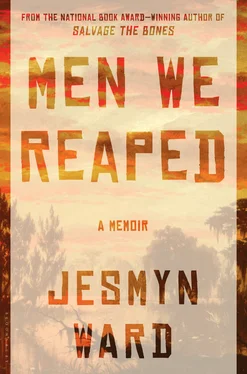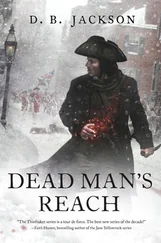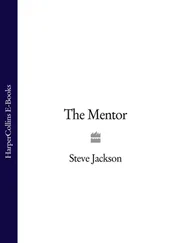“Leave my sister alone! Leave my sister alone!” she yelled.
“Get off me,” he said, trying to push her away, sliding over enough that I was able to get up and away from him. I stood.
“Leave her alone!” Charine said, kicking. Nerissa was crying. I scooped Charine up under her armpits and swung her to my waist. She had given me my voice back.
“Get out!” I said.
“What?”
“Get out!” I said. “Or I’m going to call my mama!”
He jumped up from the sofa. I ran to the side door, Charine still on my hip, and swung the door open wide, letting in the heat of the day.
“Out!”
He walked past and out into the heat, looking down at us.
“Fuck you,” he said.
“Fuck you!” I said, slamming the door, locking the dead-bolt. I was surprised I could be so angry.
Thomas hit the door, hard.
“You stupid bitch!” he said.
“I’m not a bitch!” I said. But even as I said it, I was ashamed for not fighting back earlier on the sofa. I had to be saved by a three-year-old , I thought.
“Fucking slut!” He hit the door again.
I backed away from it, Charine clinging to me. We stared at the shuddering door: Charine was alert, ready to go at him again. I’m pathetic , I thought. There was a knocking at the back door, and then Josh opened it and walked inside. I locked that one, too.
“What you locked the side door for?” Josh asked. Thomas banged again. I could hear Phillip laughing on the carport.
“Him,” I said, pointing at the side door.
“Bitch!” Thomas hit it again. There was quiet on the other side. I put Charine down, walked to the front window, knelt, and peered through the blinds as the two boys skipped out in the sun and slowed to a walk in the middle of the street. I watched them until they disappeared around the corner of the house.
It didn’t matter if my mother was home or not. Thomas caught me out when I was hanging clothes by myself or sweeping the carport. He wouldn’t come into the yard, but he would roam the edges of the fence, the woods at the back of the house, scream, I know you hear me talking to you. You hear me talking to you . And then: I see you . When he said this, I thought he meant that he saw all the misery in me, saw that I deserved to be treated this way by a boy, any boy, all boys, everyone, and I believed him.
My mother withdrew after my father left. When she was home, she was cleaning. Or she was in the kitchen, cooking. There were no more movie marathons. We had food stamps then, books of them that I was always embarrassed to spend at the Colonial Bread store, but my mother had no compunctions about using them to keep the refrigerator stocked. Unlike my father, my mother wasn’t comfortable with physical shows of affection. She didn’t hug us or kiss us or touch us when she talked to us, like he did. Sometimes I think that my mother felt that if she relaxed even a tiny bit, the world she’d so laboriously built to sustain us would fall apart. So since she couldn’t overtly express her love for us, which was as large and fierce and elemental as the forest fires that sometimes swept through the woods behind our house, she showed us she loved us the only way she knew how beyond providing a home for us, cleaning, taking care of us, providing discipline: through food. She cooked huge pots of gumbo, beef and vegetable soup, pork chops, mashed potatoes, roasts, red beans and rice, cornbread, and desserts — pecan candy, blueberry muffins, German chocolate cakes, and yellow sheet cakes that she decorated with elaborate flowers and vines made of frosting.
When she wasn’t cooking, she was in her room watching television. She had one friend in the neighborhood, a woman who’d married my mother’s distant cousin. They lived across the street. My mother’s cousin was struggling with drug addiction, so my mother bought his wife and family food sometimes, allowed her children to come inside our house when they came over to play. My mother had one close friend who was also her cousin, who’d moved away to Atlanta. Other than that, she was alone. Even as she nurtured a general suspicion of men, she saw the cunning, messy cruelty of women, too; the various women my father had affairs with, some of whom had been her friends, some of whom had known her since they’d been children, had gloried in my mother’s disgrace, had called her and told her: He doesn’t love you — he loves me . She didn’t trust women or men. Her children were her only company, but we were a boisterous, gregarious tribe she loved wholeheartedly yet had little patience for, since she had been raising children her entire life. All the choices and all the circumstance of her existence heated to a rolling boil that summer of 1990, boiled and bubbled over and burned her. It was too much for one person to bear. She stumbled.
When one of us did something wrong, like leaving our clothes on the bathroom floor one too many times after bathing, or getting into arguments with each other and fighting, she whipped all of us. Sometimes she used the short shaft of a wooden toy broom. When Joshua found it one day while she was at work, he snuck out into the woods and threw it away. She bought another one. After months of touching us only when she physically disciplined us, she switched to psychological tactics. One day she threatened to give us up for adoption, and when she heard me crying in our room late at night, she called me to her doorway and asked me why.
“Because you said you want to give us up,” I said.
“Maybe if y’all weren’t so bad,” she said, “I wouldn’t have to threaten y’all.”
And still we felt our behavior would never be good enough. I was failing her. Driven by her sense of isolation or loneliness or a desire to reveal something about her sense of discipline to me or to warn me against what she might have seen of her legacy coming to life in me, she parked her car in the carport after a trip to the store one day and told me brother and sisters to go inside, and then said to me: “Wait — stay here.” And then she did something that must have been incredibly hard for her since it was so opposite to her nature; she talked to me. She told me stories. “Mimi,” she said, “your father …” And then she opened herself up in ways she wouldn’t do for many years. She told me some things I understood at the time, and other things I wouldn’t understand until I was her age, and other things I still don’t understand, about how she grew up as the caretaker for her brothers and sisters, about her relationship with her mother, about how she loved her father and her husband and lost them both, again and again. At thirteen, I glimpsed something of what my mother had suffered. For an afternoon, I knew some of my mother’s burdens, some of which mirrored my own. For a moment, I felt keenly what it meant to be my mother’s daughter. For a little while, I was wiser than I had the maturity to be, and I did what I could. I listened.
And my mother listened too, when she could, to our furtive whisperings. We missed DeLisle, we said. We missed running barefoot along the dirt roads and eating blackberries, hot with juice and sugar and sun, and floating in the current of the river. We didn’t like walking in a little tight group down to Bel-Air Elementary in the summer to eat free lunch in the cafeteria, feeling awkward and poor. So she asked us: “Do y’all want to move back to DeLisle?” And we said yes.
My mother, frugal by necessity, had saved enough money to buy half an acre of land from her father’s sister. In the summer of 1990, she set out to clear it, armed with machetes and chainsaws along with her brothers. Sometimes she brought us along on her days off that summer before we moved, and sometimes she didn’t. On one of the days when she didn’t, Joshua and I left Nerissa and Charine in the house and walked back into the woods. If my mother knew, she’d be angry I left my two youngest siblings alone, but I wanted to see that cellar again. I needed to see if it still gaped in that small clearing. I didn’t fully understand that it had taken on a symbolic importance for me, a physical representation of all the hatred and loathing and sorrow I carried inside, the dark embodiment of all the times in Gulfport when I had been terrorized or sexually threatened. I didn’t understand that it had become an omen for me. When Joshua and I got there, we found the plywood that had covered the top of the cellar gone, so what remained was a large, open ditch lined with pine straw, perfectly square and dark. Somehow it was even more awful to see the dim recesses of that man-made hole, and my response was visceral. I felt as if I were down in it, as if my world had shrunk to its confines: the pine straw pricking my legs and arms, the walls a cavern around me, tall as a line of trees, the sky itself obscured. I couldn’t escape it. Its specter would follow me my entire life. Joshua and I stared into its maw without talking, and then left. I wonder if he felt something as well, standing there on the crumbling edge of that awful hole, of the awful future we would bear.
Читать дальше












